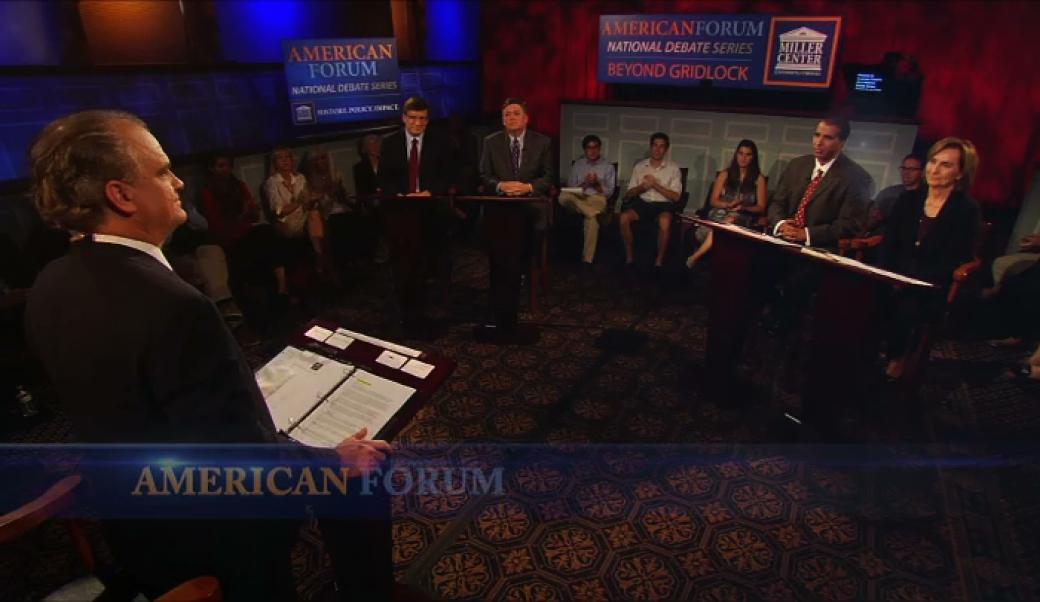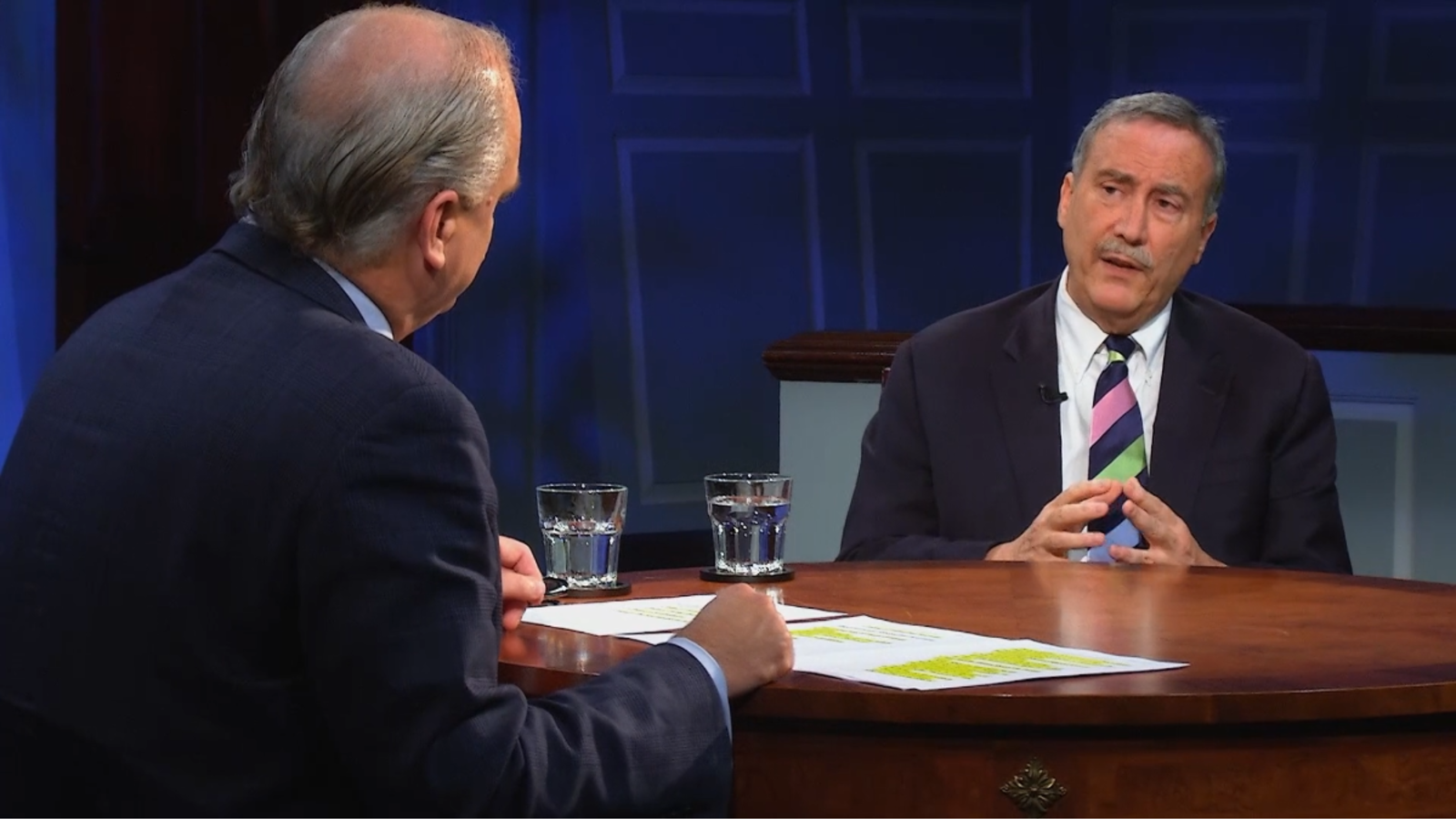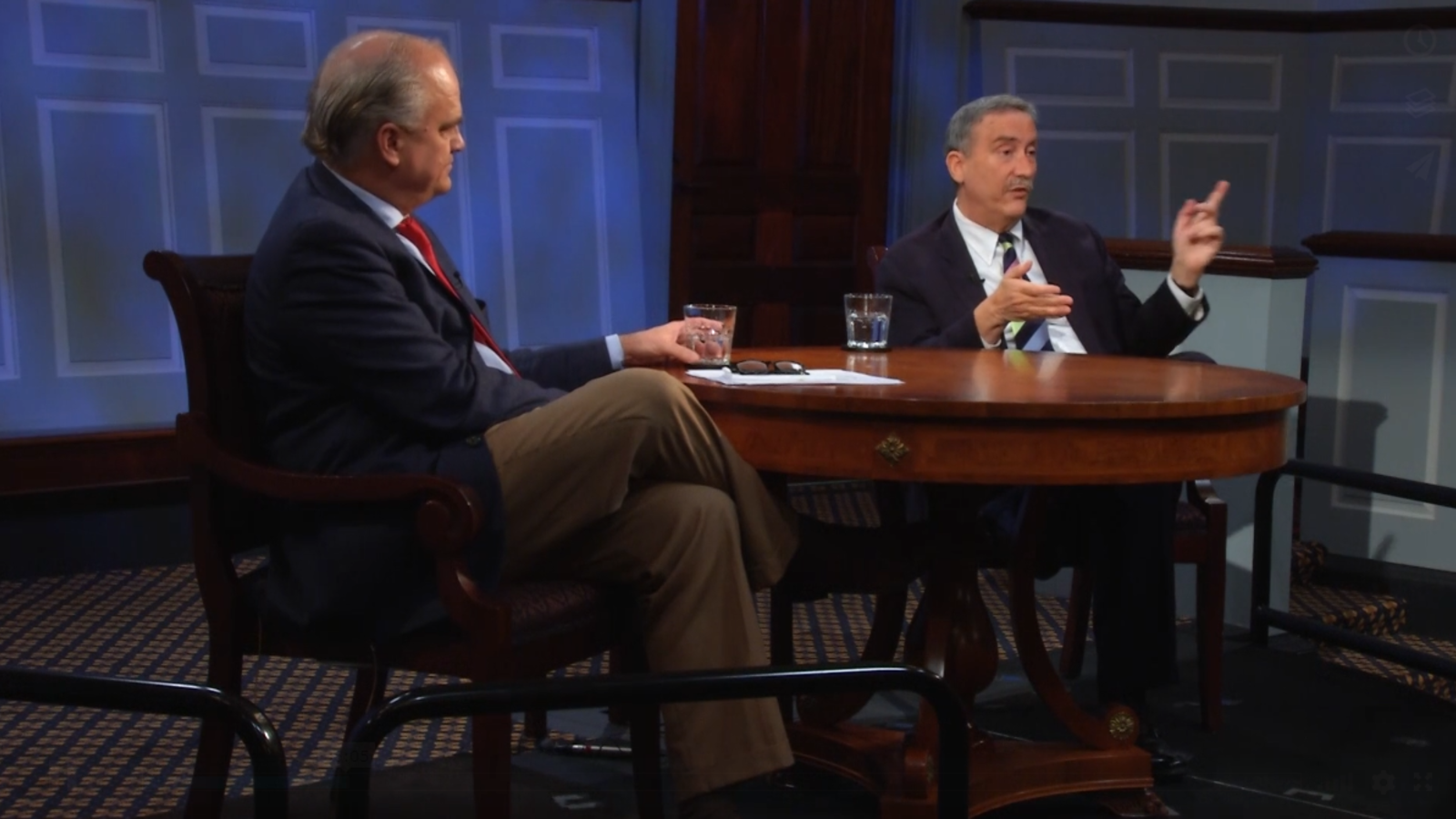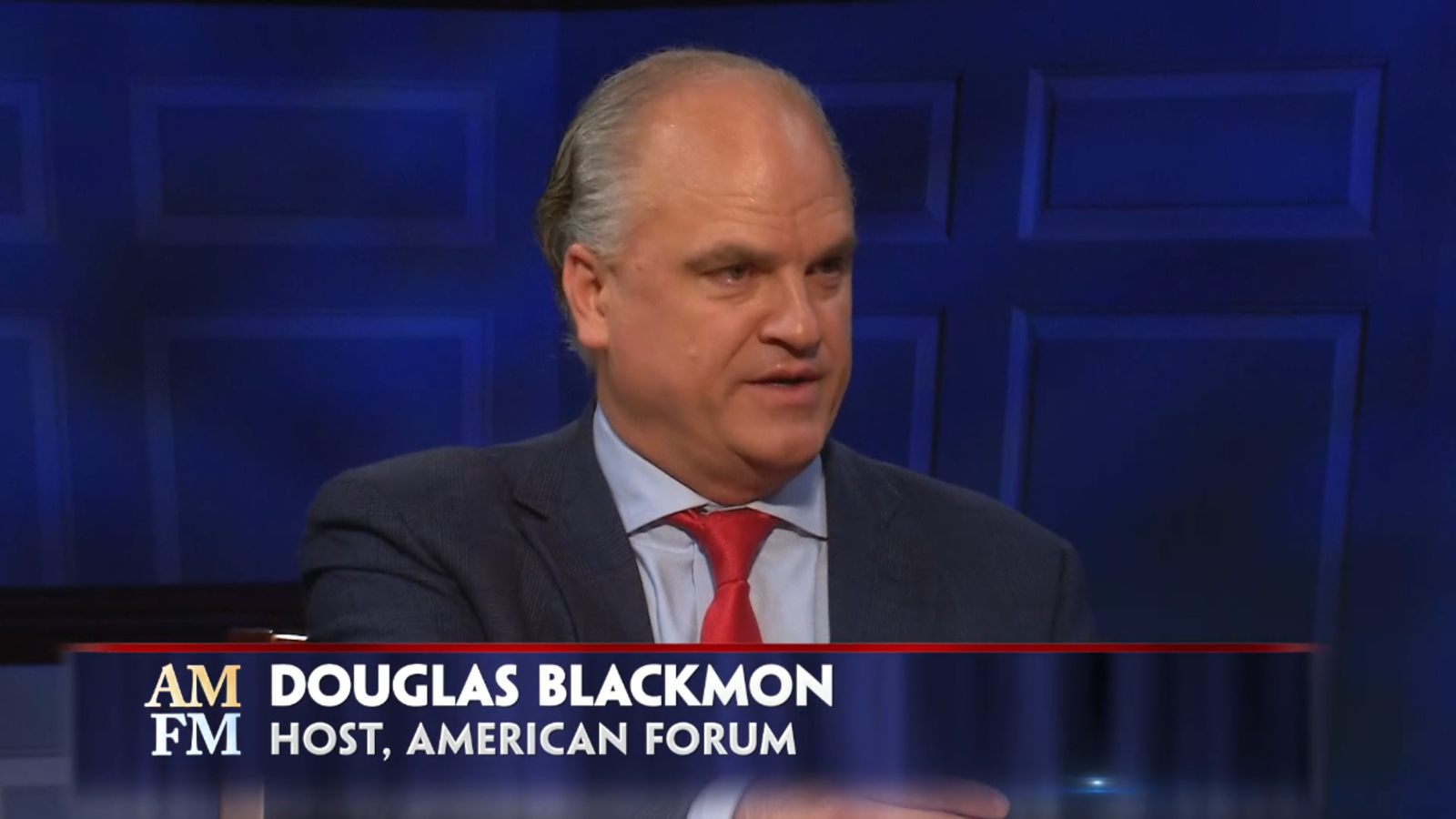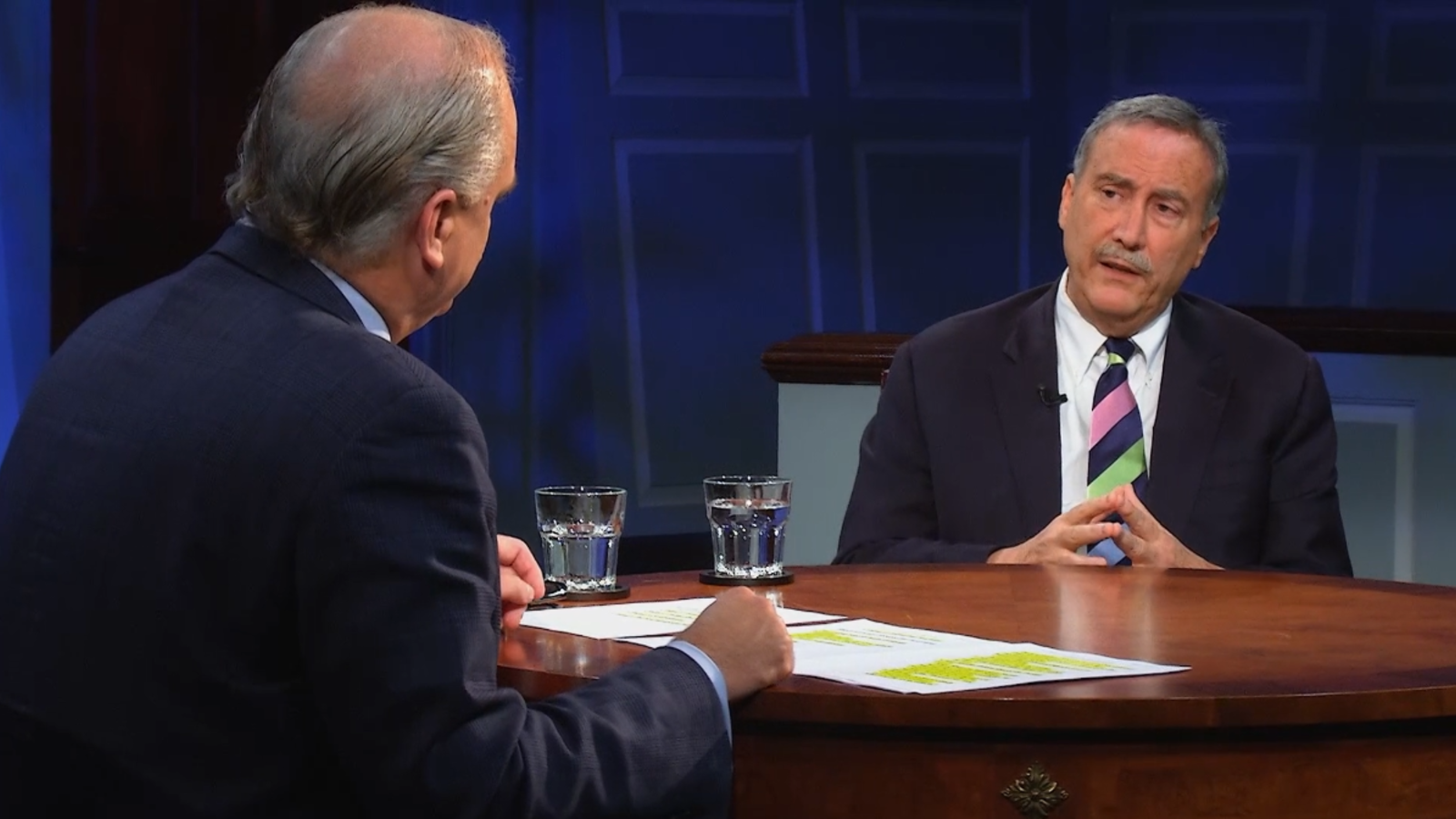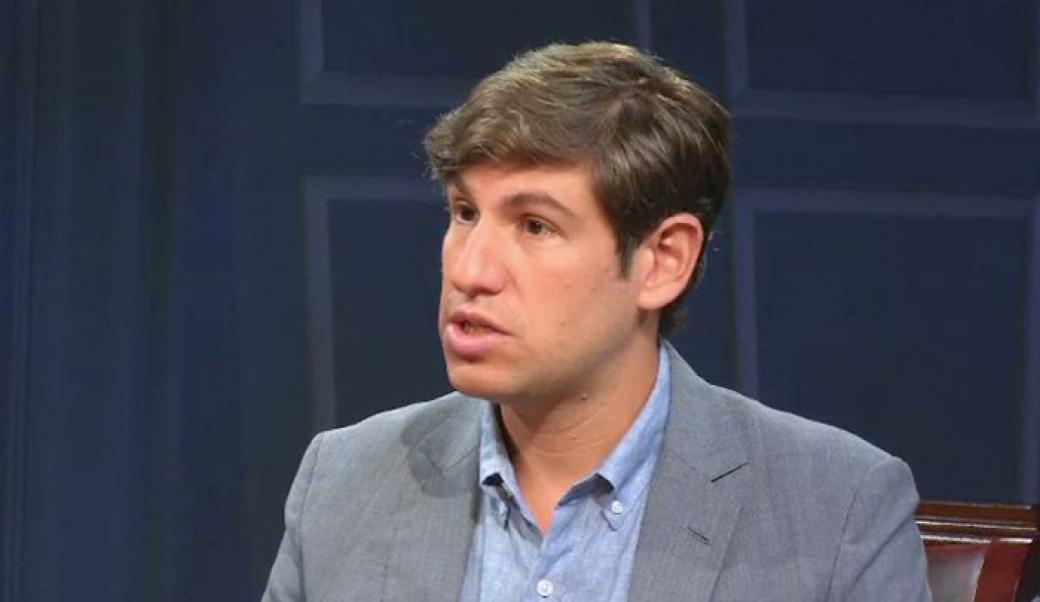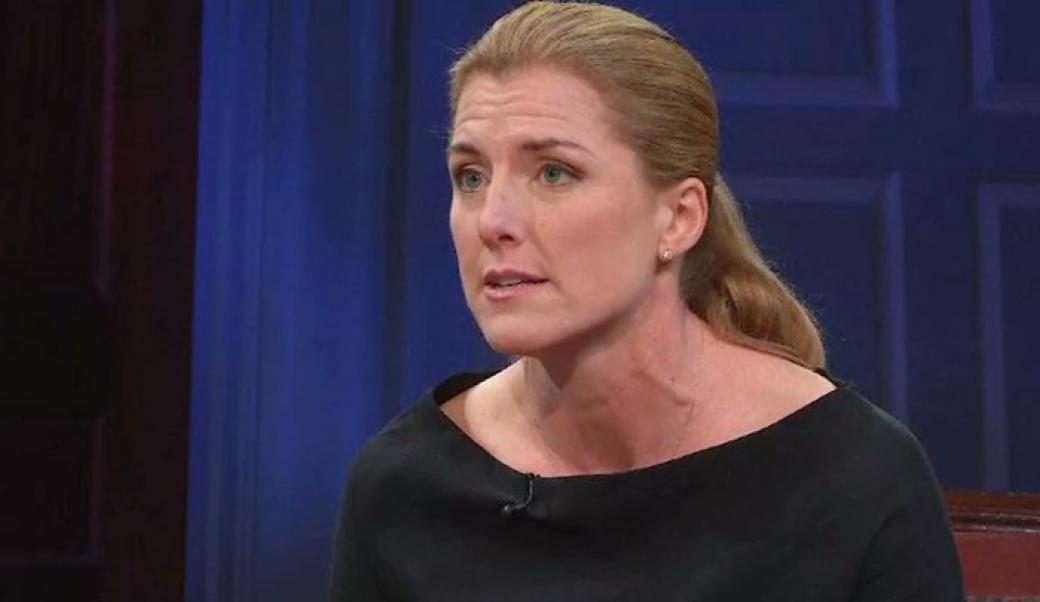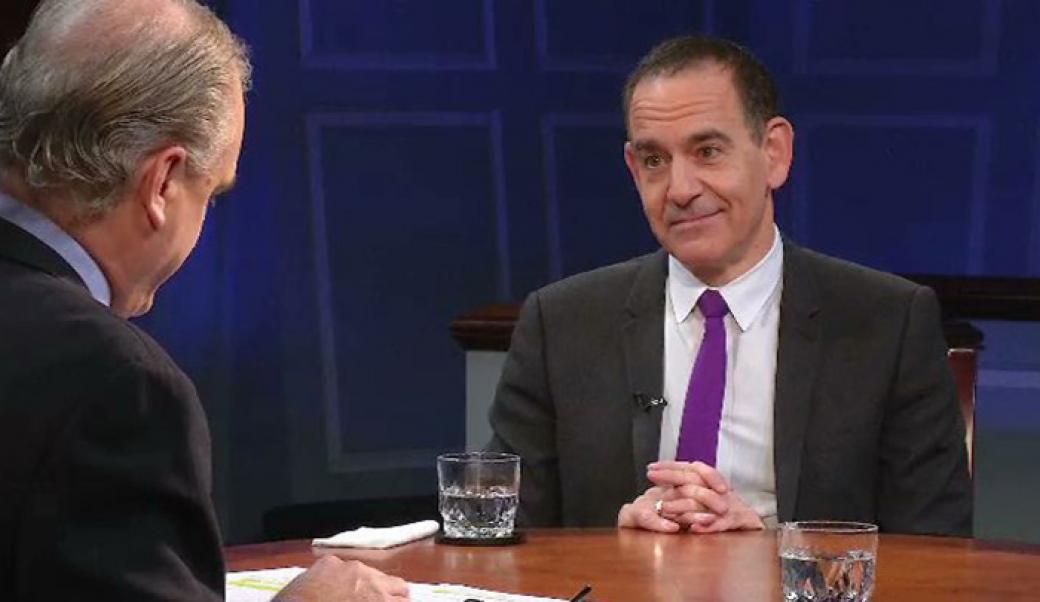About this episode
December 20, 2017
Larry Sabato
Hosted by Douglas Blackmon
Elections
Is a political storm coming in 2018?
Transcript
00:40 Douglas Blackmon: Welcome back to American Forum. I’m Doug Blackmon. After Barack Obama won the 2008 national election, a huge question loomed over American politics: was it a fluke? Or had our country crossed a profound, maybe irreversible historical boundary? It looked like that might be the case when Obama was reelected over Republican Mitt Romney four years later. After that vote in 2012, the Republican National Committee famously attempted to self-diagnose their defeat. The result was a one-hundred-page plan to retool their party, to be dramatically more inclusive of and appealing to women, African Americans, Hispanics, gays and lesbians and many others. Those Republicans concluded the key to taking back the White House in 2016 was to communicate the value of conservative policies, but embrace how racial and lifestyle diversity was evolving in America. But then came Donald Trump and a radically different game plan for Republican success. Instead of embracing diversity, he and the architects of his campaign said the key to electoral victory would be to maximize white votes, especially among evangelical Christians. Mr. Trump was already the most famous proponent of the Birther conspiracy, suggesting President Obama wasn’t born in America. Trump labeled many Mexican immigrants rapists and criminals the same day he announced his entry as a Republican candidate, and in the eyes of many people, his campaign openly encouraged racial and ethnic divisiveness. Late in election season, audiotape surfaced in which he appeared to have bragged about committing sexual assault. Many Republicans backed off their endorsements of him. Pollsters gave him almost no chance of winning. And yet, in November 2016, Donald Trump was elected President of the United States. A year later, Trump has the approval of only about one-third of Americans, and his negative ratings, approaching sixty percent, are the highest ever recorded for a new president. So, as we approach the second year of the Trump presidency and campaigns begin for the upcoming midterm elections, it turns out that 2018 may be as big a test of what is really happening in American life and politics as we thought 2012 was going to be. What is the future of the Republican Party? A return to the one its leaders mapped out in 2012, or a further doubling down on the coarse rhetoric of the past two years? Thirty-three seats in the Senate and all 435 in the House of Representatives will be contested this year, and the very longevity of the Trump presidency may hang in the outcome of those votes. Joining us in this episode to help unpack what the 2018 midterm elections may mean for the country is Larry Sabato, director of the University of Virginia Center for Politics, a frequent commentator on cable television, and a New York Times bestselling author. He has written and edited over two dozen books on American politics, including Trumped, a collection of essays from scholars asking what happened in the 2016 election? Larry has also won three Emmy awards for his documentaries on Congress, John F. Kennedy, and the 1976 presidential election, and is the editor of Sabato’s Crystal Ball, a weekly newsletter that the Pew Charitable Trusts ranks number one in the field of political prediction. Thank you for being here.
Sabato: Thank you very much, Doug. Nice to be here.
Blackmon: So, first let’s talk about the past year, this first year of the Trump presidency. Has Donald Trump turned out to be the president that he was promising to be as a candidate?
Sabato: I think he’s turned out to be the president that we would have expected him to be from the campaign he ran. Nothing’s changed. Not even the tweets. You know, people often talk about the presidential pivot, that the office makes the man. That hasn’t happened. Donald Trump has reshaped the presidency. Whether you like him or dislike him, like what he does or dislike what he does, he’s changed remarkably little. People talk about presidential temperament. In a traditional sense, however you define presidential temperament, I think it’s fair to say Donald Trump doesn’t have a smidgen of it. He has his own way of conducting his life and conducting his business, and he has taken it right into the Oval Office. And again, people are dug in. He hasn’t made a single convert and he probably hasn’t lost very many, if any, of his core supporters.
05:04 Blackmon: And it’s a—it is interesting that we have now the—and we may talk about fake news and that whole discussion—but these dueling narratives that are actually kind of fascinating in terms of how seriously many people believe, both—you know, we have these dueling narratives that are in stark contradiction with each other factually, but the people adamantly believe them. And the most basic version of that, is President Trump’s own description of his first year as—that he’s the most successful first-year president history and that he’s accomplished more than anybody else, and then most of the observer class, you know, says actually almost nothing has been accomplished—though there is sort of a third narrative that says, through executive orders and administrative actions, that a lot has been done, that—and that’s the one part where probably two sides have some agreement. But how is it that we have reached this place where these exclusive competing narratives are still very honestly believed by so many people? Or is that not the case? Or is this all a charade and people know that the other version actually is the true version? What is it?
Sabato: I think it has more to do with partisanship than anything else. We live in an era of what’s called negative partisanship, where you hate the other side as much as more than you like your side. And so, your views are shaped in part by what the people you don’t like say and think. As far as Donald Trump is concerned, he has such a strong, overpowering personality—I wouldn’t say philosophy. I’m not sure what it is, but—you know, people call it populism. It’s all over the place. But people define themselves in relation to Donald Trump. I’ll give you a perfect example. Trump has been saying things about the Access Hollywood tape now, as president, that directly contradicts what he said during the campaign. You remember that tape that came out and it was very controversial, and we don’t need to review what it said. But it was unfortunate for him, although it didn’t affect his election. But he admitted it. He went on tape apologizing for it, calling it locker room language, and all the rest.
FACTOID: In October 2016, Trump admitted, “I said it, I was wrong and I apologize.”
What has he said now? It’s phony. It was made up. Somebody was imitating his voice. I’m surprised he didn’t accuse Hillary Clinton of it. (laughter) But I don’t think her voice goes that low, but—(laughter) you know what I found fascinating, though, in looking at Twitter and other social media? The same people who believed him completely in October of 2016 believed him completely now. Well, wouldn’t you think that’s contradictory? Was he right then, or right now? And their answer is either, “I don’t care” or “Yes, he was right both times.” 07That’s the definition of a hardcore base. Critics would call it a cult.
07:50 Blackmon: So, what has happened that those things can be reconciled now with this very large group of Americans?
Sabato: We’re so separated by party—and then, you add on top of that someone like Donald Trump. He goes right to the core of the people who support him, and they constantly say things like, “He’s saying the kind of things that I’d say if I were in power.” And they really—they identify with him so strongly they’ll cut him a break on almost anything. He said it himself in the campaign. “I could go down to Fifth Avenue and shoot someone and they’d all applaud.” And I just hope they’ve taken his guns away, because I think it’s exactly the same way today.
08:30 Blackmon: In the campaign and what he was—and what President Trump was elected on are more about drain the swamp, get the—get not just the elected crocodiles in the swamp, but the lobbyists and all those folks out—that really hasn’t happened. We’ve seen lots of data about that. Build this wall at the border. Dramatic changes in immigration. The Muslim ban or the travel ban on people from some predominantly Muslim countries, however we want to refer to that. Repealing Obamacare, jailing Hillary Clinton, opioid—I mean, these things that were issues in the campaign, those are the things that really have not happened. Does it matter? Does it matter to the base whether any of those things actually occur?
Sabato: Well, first, we’re only eleven months into his presidency, and a four-year term is a very short period of time, but it’s also a very long period of time in terms of policy. And we don’t need to get into whether he’ll get a second term. But I think some people are deluding themselves into believing that he’s automatically a one-term president. That the hart part’s getting in the first time. Now, you can blow it and throw it away for lots of reasons. But by and large, I would say that his base says he’s trying to do these things and they’re stopping him. Now, who are they? The lobbyists. “He’s trying to drain the swamp, but the swamp was much deeper than anyone imagined,” which is what Trump says. Trump talks about the Democrats opposing him, but he also goes after specific Republicans. Lots of Republicans. He said terrible things about virtually every leader, as well as some rank and file people like Jeff Flake, a senator from Arizona.
FACTOID: Flake: GOP “Toast” if it becomes “the party of…Donald Trump”
So, he has arranged things so that he has a large group of enemies to blame, and his followers are more than happy to blame them. They go right along with what he says, again because they identify with him so strongly. That’s a good thing for him. We might argue it’s a dangerous thing for our system. Some agree with that, some don’t, but you could make that argument.
10:28 Blackmon: It was revealed today that former National Security Advisor Michael Flynn has been indicted and is pleading—has, by now, plead guilty to having lied to the FBI. I believe that would have been the interview with him on January the 28th, I think, or thereabouts.
Sabato: Well, he lied—at least one of the two times, he lied before Trump became president, but during the transition. [Blackmon: Ah, okay.]
FACTOID: Flynn admitted lying to FBI about talk with Russia ambassador
And they haven’t touched him on a lot of other things, because there’s probably a deal. [Blackmon: Yeah.] The deal has been made. He’s providing information on others.
11:01 Blackmon: And so, what do—even though we don’t know the—you know, the full contours of what this—of exactly what’s there yet, it is important that this is an indictment that’s not about him failing to register as a foreign agent or, you know, if he did—properly did things in relation to the work that he did for the government of Turkey or, you know, other folks. This is about events in the Trump presidency, and with someone who then ends up as an absolutely central figure in the White House after the administration begins. So, how—I’m, again—just admitting that we don’t—there’s a lot we don’t know, but based on what we do know, how significant—event—an event does that seem to be to you?
Sabato: To me, it’s obviously significant. I mean, this is not just anybody. It was the person who was the senior foreign policy national security advisor to Donald Trump, the winning presidential candidate during virtually the entire campaign. He was the spokesperson with Trump, he traveled with Trump. He’s the person at the Republican National Convention who led the cries of, “Lock her up!” Her being Hillary Clinton. Kind of ironic now, isn’t it? (laughter) But this is a very significant person. He knows a lot, and he is a direct connection between Putin and the Russians and the Trump campaign.
FACTOID: Flynn served 33 years in the army, was Obama’s DIA director 2012-14
After all, he went, sat next to Putin at a dinner. He accepted a large fee. There are lots of other connections there, and clearly, he had ulterior motives for lying to the vice president, which is the pretext for his firing from the administration.
FACTOID: Flynn was fired February 2017 after 23 days as national security advisor
So, to me, it’s significant. But everyone wants to know, well, does it lead to Donald Trump? My answer would be in two parts. The first part is no, and the second part is: I was among those who believed that Nixon was much too smart to have participated in the bugging of Watergate. (laughter)
12:47 Blackmon: Well, and interestingly enough, (laughter) I’ll make a similar confession, that at this table over the past year or so, there were any number of times, after the collusion allegations began to surface, that I said to various people here that I hadn’t—still hadn’t seen anything that suggested actual collusion. And it seemed as amateurish as that campaign was in so many respects—and I mean that just in the sense of people who’d never been involved in politics before—and as reckless as they appeared to be at times, for the longest time I essentially said the same thing: it’s just almost impossible—I’m not even sure they would know how to have actively colluded with the Russians. But then, after we had the testimony from Sally Yates back in the spring, and then I spent a lot of time with Sally Yates after that for—and with a New Yorker reporter, talking through the details of all this, this sequence of events after the administration begins and after General Flynn does have this conversation with the Russians about sanctions and the possibility of removing sanctions and then does mislead the FBI again, in an interview after that—that that’s all very crucial, and really boils down to the question of whether President Trump knew about those interactions when they happened—or the thing that seems frankly impossible to me, that after having successfully convinced Putin not to have retaliatory sanctions on the U.S., which is clearly what happened, it seems impossible to me that General Flynn didn’t proudly tell President Trump that he was the person who had arranged that. And if that’s the case, it seems implausible that it could—that it could not be. But if that is the case, then that dramatically affects everything that relates to former FBI Director Comey and all those other events after that. So, it does seem to me a very, very substantial development.
Sabato: And you have to have proof. I mean, if it ends up being General Flynn and President Trump in a room, and they’re talking to one another and nobody else is there—and I don’t think he has a taping system, even though he’s hinted here and there that he does—it’s just one person’s word against another. [Blackmon: Yeah.] But, you know, for Flynn—I mean, given his breadth of experience—and I’m always surprised by this. I’m always surprised when people lie to law enforcement, particularly the FBI, because if they catch you, and they usually do, they—if they catch you in a lie, you’re automatically in a world of hurt, wholly apart from the offenses you may have committed in the first place. And it seems to me that intelligence has nothing to do with whether people conclude it is in their interest to lie or not. No one ever learns the lessons of history there.
15:26 Blackmon: So, now let’s talk, though, about—is—back up in time, and you—after the November 2016 election, you came out a few days later, even before all the votes had been counted, with a big mea culpa. You know, said, “We got it wrong,” you know? And you kind of walked through the—how things were wrong, and most polling entities had a similar story to tell, though as time has gone by and things have settled out, we’ve actually gotten a little more comfortable with that—a lot of the polling was right about the popular election, what the popular vote was going to be, but got it wrong in terms of how that—what that was going to translate into in terms of the Electoral College. And I think your story sort of fits into that narrative, as well. But at this stage of the game, when we look back on it, what is it that we understand about the American electorate today that, you know, that you get about the American electorate today that you were missing back in October of 2016?
Sabato: Well, first, Doug, thanks for bringing this up. (laughter) There’s nothing I enjoy more than the biggest miss that my entire profession has ever had. I wasn’t alive in 1948 when Dewey defeated Truman, except he didn’t, so—and this is the biggest miss of polling, pollsters, and pundits since 1948. Now, the question’s always how’d it happen? And you were correct to point out that we put too much faith in the popular vote driving the Electoral College, which by and large is almost always done. Yes, 2000 was an exception, and 540,000 votes that Gore won by sounds like a lot, except it really wasn’t in terms of the whole election. And the other misfires, so to speak, of the Electoral College weren’t really misfires if you really examine what happened. So, this was spectacular. But there were reasons for it that we didn’t anticipate in advance. One that nobody ever mentions is the simple fact that Donald Trump crashed and burned in California in a way that no Republican presidential candidate in history has ever done. Nobody mentions the fact that Obama did worse than Hillary Clinton in California, that Donald Trump actually fell below Alf Landon’s percentage in 1936. He was barely above thirty percent in California. Why am I bringing that up? Because California’s gargantuan, and Hillary Clinton’s entire, almost, three million vote margin was from California and then some. California had more than those three million votes. Nobody anticipated her building up a plurality like that in California, which in turn meant that in the other close—in the close states that she had to outperform the polling in some places, like Wisconsin and Michigan—although Wisconsin, Michigan, Pennsylvania were very misleading. Their pollsters there were very misleading. The battleground state polling in most states was awful. It was terrible, and it had never been terrible before. Nationally, the polling’s about right. The polling average on the morning of the election had Hillary Clinton up three percent. She won by 2.1 percent.
FACTOID: Clinton lost electoral vote 306-232, but won popular ballot by 3 million
That’s well within the margin, even of a collapsing of all that polling data. So, I learned, number one, never to expect any more, ‘cause I think this is going to become standard. I will never expect the popular vote to generate an Electoral College majority unless it’s a wide margin in the popular vote. And obviously, two points isn’t enough. Had she won by three, I think it would have been just enough to tip Wisconsin and Michigan and Pennsylvania, maybe even Florida. Those were all states that were a percent or less. She got an additional percent, she might have been able to do that. But the much more important point that I learned is that (laughs) Americans have now taken after the British. Some of them either lie to pollsters, though I tend to believe they just don’t answer, disproportionally. It’s a non-response bias. A lot of Trump voters were embarrassed to admit they were for Trump. They were embarrassed to admit it in their families, because they knew it would lengthen Thanksgiving dinner. (laughter) They were embarrassed to admit it to their coworkers, because they worked in professional offices, and overwhelmingly, people who were well-educated, whites and minorities, well-educated voted for Hillary Clinton. I saw that myself, without mentioning the specific example. I had a case of that myself, personal case. So, we learned that the non-response bias is something that we have to take into account in the future. And there are ways of getting around it. It’s expensive and you have to use some—a lot of online polling to balance what you’re getting from live interviewers. People, interestingly, will be more honest in a, quote, anonymous online survey than they will be talking to another human being on the phone. Even if they’re promised anonymity, they don’t quite believe it, or they’re—again, they’re embarrassed to tell. So, those are a couple of lessons that I learned. And I also—I’d add a third one. You mentioned Trump’s popularity ratings. His polling average right now is around thirty percent. Add five. Just add five, right on top of it, because the non-response bias is still there, and some people aren’t quite telling the truth.
FACTOID: Trump has 38% approval rating, down about 6% from January 2016
And thirdly, a job approval rating does not necessarily predict your percentage of the vote in a race where you’re running against another live human being, not against the image of perfection, which people may have. So, really, he’s not very far from the forty-six percent he got on Election Day, even with—I’ve lost count of the—I can’t count that high, the number of controversies that he’s been in. I can’t count the number of tweets that have backfired on him. And you would think that that would have hurt him, but it hasn’t.
21:18 Blackmon: Yeah. All right, so given all of this, give us a prediction for what’s going to happen in 2018 and out of—and of those thirty-two Democrats that are saying they’re going to run for president, gives us a couple of names that we ought to keep an eye on. But start with 2018. What’s going to happen?
Sabato: Well, I’ll start with 2020. The nominee clearly is going to be The Rock. (laughter) Just kidding. (laughter)
Blackmon: I don’t know! (laughs)
Sabato: Although I get emails daily from Rock supporters, Dwayne Johnson supporters who—and after Trump, who would rule anybody out? (laughter) I mean, you know, a dead cat in the road you know, possibly, could be a nominee. (laughter) So, I’m not going to be in that business yet for 2020. For 2018, it comes down to this: you have to look at each category separately. House of Representatives is heavily gerrymandered. Now, in some states it’s gerrymandered to the Democrats. But in a much larger number of states, it’s gerrymandered to the Republicans because, under Obama, the Republicans won everything that wasn’t nailed down in 2010 and 2014. So, they have the largest number of governors they’ve had since the 1920s, the largest number of state legislators they’ve had since the 1920s, and they’ve created districts that maximize the opportunity for Republicans.
FACTOID: In 2014, GOP gained 13 seats in the House and 9 seats in Senate
Even given that tremendous advantage, I think it’s inevitable that Democrats will gain seats in the House.
FACTOID: GOP controls governor, legislature in 26 states; Democrats in only 6
They have to gain a net of twenty-four, which is a tough thing to do. You can see them getting to fifteen or sixteen. You can find those districts. But if there’s a wave and if the wave is tall enough, as it was for the Republicans in ’94, and 2010, and 2014; as it was for the Democrats most recently in 2006 and presidentially in 2008, if that happens, if there is a Democratic wave, they can actually take over the House. It’s not a prediction you’d make today, but it is within the realm of the possible. The Senate is a very different creature in almost every way. And since only a third are elected every two years, this third breaks down in an unusual way. There are only going to be eight Republican seats on the ballot out of thirty-three or thirty-four, depending on vacancies. You have twenty-five Democratic incumbents. I’m counting the two independents who sit with the Democrats, twenty-five! And ten of the twenty-five are in states that Trump carried by, in some cases, twenty-eight points. So, that is a danger for Democrats. They may lose additional seats. Now, again, if there’s a wave, is there some way they could get to fifty-one seats? Sure, there are ways. I think it’d be a tremendous victory for them if they kept the forty-eight seats total that they have right now, or even lost only one or two. So, that’s different. The big headline of 2010’s going to—of 2018 is going to be the governorships. There are thirty-six governorships on the ballot, again, because Republicans won so many in 2010 and 2014. You have a lot of vacancies because of term limits coming up. Democrats, I think, are bound to win, net, at least a half a dozen more governorships, and some in large states. And they’ll pull in loads of state legislators. That will affect the next redistricting that will occur in 2021. So, you know, the worm turns. It always turns. It can turn one way presidentially, and another way in Congress and in the statehouses. So, you know, the great game of politics goes on.
24:49 Blackmon: Larry Sabato, thanks for joining us.
Sabato: Thank you, Doug.
Blackmon: A quick programming note for our viewers: I’m sad to report that American Forum is going off the air in a few months. In the weeks ahead, we’ll continue bringing you new episodes, including an upcoming conversation with former acting U.S. Attorney General Sally Yates, one with New Jersey Governor Chris Christie, and another with former U.S. Poet Laureate Rita Dove. Then, in March, we’ll sign off for good. But please keep coming back every week, and as long as we’re here, we’ll keep pushing for civil, informed discourse, even in these deeply divided times. If you’d like to share your thoughts with us about President Trump’s first year in office or your predictions for 2018, drop me a line via the email on your screen or on Twitter @DouglasBlackmon. You can follow our guest @LarrySabato, or check out CenterForPolitics.org. See you next week.
